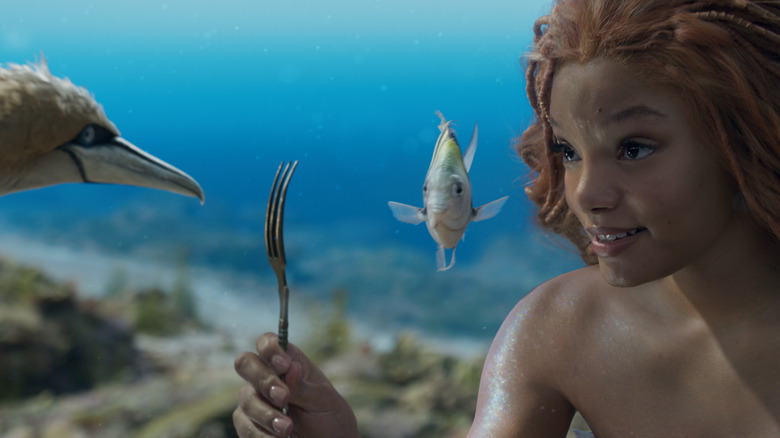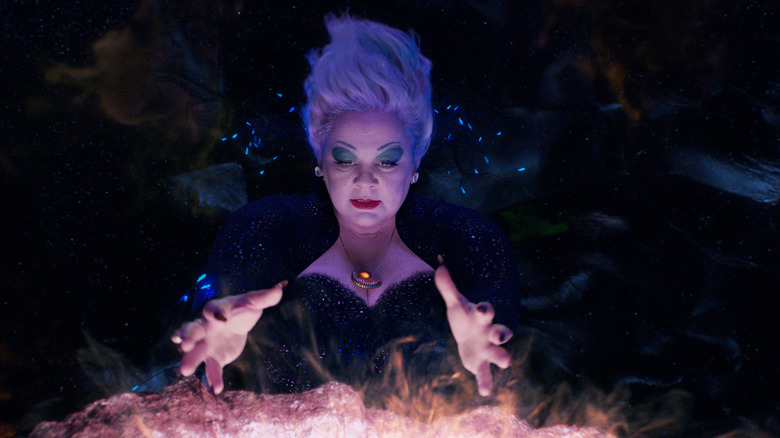The Little Mermaid Review: Dives Into Nostalgia
- Halle Bailey is an absolute delight
- Adds nothing to the material to truly justify its existence
- Underwater creature design seriously off-putting
- A true slog, pacing wise
Another day, another Disney animated classic dragged kicking and screaming from the vault into the harsh, cruel light of "live-action adaptation." This go-around, it's "The Little Mermaid" — a beloved 83-minute fairy tale transformed into a strained 135-minute pale imitation where the titular sea nymph doesn't get her Faustian legs until a full hour into the proceedings.
Setting aside Halle Bailey's "controversial" casting as Ariel and any other campaigns that are propping up the film's detractors, "The Little Mermaid," like all of Disney's ill-conceived live-action reimaginings, is a safe, hollow exercise in weaponized nostalgia. All remakes are to one degree or another purely financial enterprises designed to suck dry the retired teats of box office hits gone by. But there's something particularly pernicious about taking classic, digestible, and most importantly endlessly re-watchable family films and making them over, only bigger and uglier and lengthier.
Unfortunately, Disney has now done this several times successfully, so the remakes will continue until morale improves or the stock nosedives. In the face of this never-ending cascade of mediocrity, we can only dig through the rubble with our tired hands in search of some small joys to make the endeavor retroactively worthwhile. The alternative of plugging our ears with our fingertips, squeezing our eyelids shut, and singing "la la la" while pacing back and forth may not be enough to prevent an errant "Under The Sea" from seeping into our subconscious.
Caught in the undertow
Disney's 1989 version of "The Little Mermaid" is an enduring little fairy tale. Its central tale of a mermaid princess who longs to explore the surface world requires no real modern retelling to connect to Gen-Z audiences, but updating the narrative for fresh eyes would at least make some kind of sense. Instead, director Rob Marshall's new vision is just the old one, only plunged into the barnacle-covered depths of an uncanny valley we all might have done well never to dive in.
From a plot perspective, all the beats of the original are there, even in the same order. But for the film's first hour, spending time with Ariel (Halle Bailey) in the ocean serves to make us relate to her even harder. Not because the story is more nuanced or somehow better fleshed out. No, the more time we spend with the horrifying visage of Jacob Tremblay's Flounder as an actual, real-life fish and Daveed Diggs' Sebastian as an actual semblance of a crab just with cartoon googly eyes, the more harrowing the experience becomes. In the wake of "Black Panther: Wakanda Forever" and "Avatar: The Way of Water," these aquatic environs are too plasticine and unimaginative to match the lyrical wonder of the original.
By the time Melissa McCarthy's (admittedly toned down and less camp) Ursula arrives on the scene, her manipulative bargain feels refreshing. From there, the movie more closely resembles and hews to the tone and tenor of its predecessor. A welcome change of pace, to be sure, and it further cements Bailey as a star whose casting was well worth drawing the ire of racists and sycophants everywhere. Of course, her vocal range is astonishing, breathing new life into these well-worn old tunes. But once she drops her voice off at the evil cauldron pawn shop, she flexes her stage presence and ability to do so much with her eyes and imperceptible facial changes.
Jonah Hauer-King brings little to the table as Prince Eric, other than chemistry with Bailey. Javier Bardem as King Triton, despite occasionally and unfortunately resembling Hulk Hogan as Aquaman, proves perhaps the only actor on board taking the assignment seriously, bringing real pathos to the strained relationship with his daughter.
But what does this 2023 version do that a VHS copy of the 1989 film cannot?
Dinglehopper in the road
Well, nothing! There are exactly three new ideas Rob Marshall and his collaborators have brought to this project. The first is the retcon that Ursula is Triton's sister, a familial revelation that doesn't pay off in any way whatsoever, as the film's climax is beat for beat the same. The second is the idea that the surface world and the denizens of the ocean are ... prejudiced against one another? Pretty pointless, considering no one needs to expound upon the difficulties of dating someone who is literally a different species by washing the love story in Montague/Capulet cosplay. But the third comes closest to actually mattering.
Exactly at the point that Ariel's voice is robbed from her, the film gives her the new song "For The First Time," penned by Lin-Manuel Miranda. It gives Halle Bailey a chance to perform Ariel's inner turmoil and tactile reaction to her new human body as an internal monologue given external reverie by Marshall's staging. It's the closest the film feels to having any new wrinkles to share on its source material, and within record time, that goodwill is overshadowed by Miranda's idea to have Awkwafina's Scuttle rapping.
There are a number of things the film could have done differently to have a chance at feeling vital. Ursula could have been played by someone a little less milquetoast. At a time when drag culture is more mainstream than ever, taking an iconic villainess inspired in part by the legendary drag queen Divine and casting an actress who has spent decades obfuscating her considerable talent by doing lazy pratfalls feels like a misstep. For the climactic stand-off where Ursula grows the size of a kaiju, Marshall literally has to obscure McCarthy's face, because an enlarged version of that smiling visage would rob the climax of what little horrifying awe it possesses.
Maybe using the bloated runtime to give Bailey more space to shine might have helped too, but let's be honest. The best way to have improved upon this film's execution is to travel far back enough in time to prevent it from being greenlit in the first place. At least tons of little kids will have Bailey's Ariel as a fun and inspiring figure to look up to, because there's little chance of this movie becoming a regular rotational viewing for any household that owns a copy, digital or otherwise, of the original.
"The Little Mermaid" premieres in theaters on May 26.


